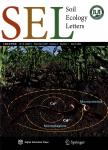Tire abrasion particles negatively affect plant growth even at low concentrations and alter soil biogeochemical cycling
作者机构:Freie Universitat BerlinInstitut fur Biologie14195 BerlinGermany Berlin-Brandenburg Institute of Advanced Biodiversity Research14195 BerlinGermany Leibniz Centre for Agricultural Landscape Research(ZALF)15374 MünchebergGermany Brandenburg University of Technology Cottbus-Senftenberg03046 CottbusGermany
出 版 物:《Soil Ecology Letters》 (土壤生态学快报(英文))
年 卷 期:2022年第4卷第4期
页 面:409-415页
学科分类:09[农学] 0903[农学-农业资源与环境] 090301[农学-土壤学]
基 金:EFL acknowledges funding from the Deutsche Forschungsgemeinschaft support from an ERC Advanced Grant Open Access funding enabled and organized by Projekt DEAL
主 题:Microplastic pollution Tire particles Plant growth Soil respiration Soil pH Litter decomposition
摘 要:Tire particles(TPs)are a major source of microplastic on land,and considering their chemical composition,they represent a potential hazard for the terrestrial *** studied the effectsof TPs at environmentally relevant concentrations alongawide concentrationgradient(0–160 mg g^(-1))and tested the effects on plant growth,soil pH and the key ecosystem process of litter decomposition and soil *** addition of TPs negatively affected shoot and root growth already at low *** litter decomposition slightly increased with lower additions of TPs but decreased later *** pH increased until a TP concentration of 80 mg g^(-1) and leveled off *** respiration clearly increased with increasing concentration of added *** growth was likely reduced with starting contamination and stopped when contamination reached a certain level in the *** presence of TPs altered a number of biogeochemical soil parameters that can have further effects on plant *** the quantities of yearly produced TPs,their persistence,and toxic potential,we assume that these particles will eventually have a significant impact on terrestrial ecosystems.



